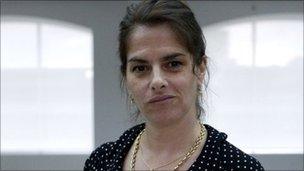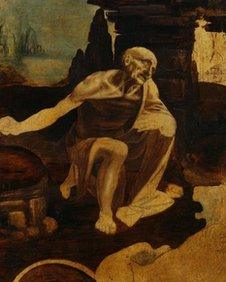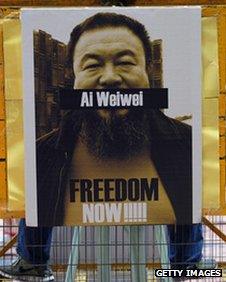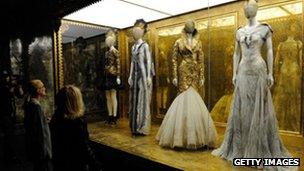Arts review of 2011
- Published

Tracey Emin figured prominently in 2011 with a Hayward Gallery show, her opening of Tate Margate and her poster design for an Olympic poster
A devastating earthquake and tsunami in Japan, revolutions in North Africa and the Middle East, riots in London and Manchester, and the imminent threat of financial Armageddon in Europe. That was the big news of 2011.
Oh, and there were some good art exhibitions too.
Tracey Emin at the Hayward Gallery, Mike Kelley at the Baltic, Gateshead, and Leonardo da Vinci at the National Gallery, to name just a few.
But then, enjoyable as they were, they hardly compare in news terms to the matters of life and death that were (and continue to be) played out during some of those major world events.
There is rarely a threat to human life in the arts; physical discomforts tend to be limited to an annoying ringing in the ears the morning after a gig, or pins and needles due to sitting in a theatre seat for too long.
But then the arts do belong to the same world in which the wars and famines and social instabilities take place.
It is true that, to an extent, music, plays, books, paintings and movies are a sideshow. But that is the very attribute that gives them their value.
It is through the observational lens of the arts that we are able to gain some perspective and a little more understanding of tumultuous events. Great art provides insight into the universal truths of life: it is unlikely to stop or start wars, but it might help explain them.

Leonardo's Saint Jerome cannot fail to move its observer
Look at Leonardo's unfinished painting of Saint Jerome, included in the National Gallery exhibition, and you see what it is to be human with responsibility: the almost unbearable tensions between body and soul, right and wrong, life and death, spelt out by the great renaissance artist in pitilessly graphic detail.
That Leonardo produced the picture over half a millennium ago takes away none of its immediacy or haunting poignancy; maybe it even adds to it. Which of those leaders caught up in the struggles of the world could look at that picture and not be humbled and inspired?
Mind you it doesn't always take 500-plus years for an artistic work to arrive in Britain that in some way helps us make sense of the news. The National Theatre's excellent production London Road was an innovative and sensitive treatment of a news story from 2006.
Using words taken verbatim from interviews with the residents of London Road, Ipswich, the play tells the story - set to music - of a local community caught up in the middle of serial killer Steve Wright's murderous campaign in and around the area.
It wasn't the only exceptional production I saw this year that had been set to music. The National Theatre of Scotland's show The Strange Undoing of Prudencia Hart, inspired by Border Ballards, sees a straight-laced academic being led on a not very merry dance by the devil. It is superb. The good news is the show will tour in 2012 - catch it if you can.
There are times when the arts not only reflect upon the news, but make it. Sadly, too often, it is due to death. Amy Winehouse's premature exit from the world's stage was shocking and sad in equal measure: her talent was evident and would have become more and more so.

Activists campaigned for Ai Weiwei's release which eventually came in June
Artist Ai Weiwei, an outspoken critic of the Chinese government, also made headline news after he was detained at Beijing airport by the Chinese authorities for alleged tax evasion and the destruction of evidence. This is nothing trivial.
But five-star reviews and 140-character Twitter comments tend to be. Now they have become the lingua-franca of critical analysis. Fame and fortune appear to have removed the political impulse from many artists. Not, though, Ai Weiwei, who has used his position as an artworld heavyweight to campaign for issues about which he believes passionately, even when his personal safety is compromised.
It was a relief and a pleasure to see Penguin's re-issue of the work of one of New Journalism's most gifted writers. Gay Talese: Frank Sinatra Has a Cold and Other Essays, provides a page-by-page masterclass in observational journalism. Talese, taking the role of flaneur, captures his subjects with skill and intimacy in articles of depth and breadth that are far too rare in today's time and space compressed media.
We know much of the news is dominated with stories based on man's endless capacity to destroy. But there is also space to report on our ability to create. Beauty is an unfashionable word in these cynical times, but even the most hardened misanthrope would have been moved by Claudio Abbado's return to the South Bank Centre with the Lucerne Festival Orchestra.
Three sublime concerts in the autumn conducted by the - now frail - great maestro were as dazzling as they were subtle. Abbado himself is mesmerising to watch, moving his arms and fingers with the grace and poise of a prima ballerina, while directing his orchestra with precision and a velvet touch.
Fashion is not a subject that often makes headlines, although a royal wedding helps. Sarah Burton, creative director of the Alexander McQueen fashion house, produced dress designs for the Duchess of Cambridge and her sister, Pippa, which have already become part of the fabric of royal legend.

Alexander McQueen was celebrated in the hugely successful exhibition Savage Beauty in Manhattan
There was an even better Alexander McQueen moment this year that began almost as soon as Kate and William walked away from Buckingham Palace as husband and wife. The Metropolitan Museum of Art in New York opened their retrospective featuring the designs of the fashion house's eponymous founder.
I have never seen a better conceived and presented fashion exhibition; a show that not only celebrated the work of the designer who died in 2010, but with taste and intellect drew out his creative genius. The great shame is that there is still no agreement to bring the show - a blockbuster success in Manhattan - to London, McQueen's home town.
It seems odd to be spending so much on a Cultural Olympiad in 2012 and yet not be able to find the necessary money or partners to put on a show of one of the country's most gifted contemporary talents.
In 2011, the recession nipped at the ankles of the arts: book publishing took a hit, the booming live events market started to feel the squeeze, and an over-reliance on brand names across the piece suggests a waning appetite for risk among commissioners.
This year's nip will be 2012's bite as the cuts imposed in 2011 materialise. There will still be plenty of ground-breaking, thought-provoking, trend-setting art, plays, books, songs, festivals and films to report on but I suspect, when it comes to the arts overall, it won't be all good news.